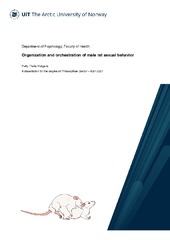| dc.contributor.advisor | Snoeren, Eelke | |
| dc.contributor.author | Huijgens, Patty Thalia | |
| dc.date.accessioned | 2021-08-19T11:52:53Z | |
| dc.date.available | 2021-08-19T11:52:53Z | |
| dc.date.issued | 2021-09-07 | |
| dc.description.abstract | Sexual behavior is innately motivated and rewarding. The underlying neurobiological
mechanisms of sexual motivation, copulation, and sexual reward have not been completely unraveled.
This thesis gives insight in the structure, organization, and neurobiological orchestration of male rat
sexual behavior. The research presented in this thesis demonstrates that a more extensive behavioral
annotation allows for a more thorough analysis of the behavioral organization of copulation. By
utilizing such analyses, we showed that the durations of inter-copulatory intervals are strongly
correlated in individual male rats. This advanced understanding is valuable for the formulation of
hypotheses about neurobiological underpinnings of sexual behavior. In addition, the more detailed
behavioral analysis made it possible to conclude that the medial amygdala influences the latency to
ejaculation through the processing of sensory feedback rather than impacting copulatory pace or
efficiency, in a study in which we chemogenetically stimulated and silenced the medial amygdala.
Neuronal circuitry involved in the orchestration of sexual behavior, including the medial amygdala and
the medial preoptic area, is modified by gonadal hormones. It is reported in this thesis that
gonadectomy and treatment with dihydrotestosterone affects dendritic spine plasticity in these
mentioned brain regions, as well as in the nucleus accumbens, an important node in the mesolimbic
reward system. Hormone-induced neuronal plasticity is hypothesized to permit the functional
neuronal circuitry to orchestrate sexual behavior, and to be at the basis of long-term sexual reward
learning. Together, these findings advance our understanding of the neuronal regulation of sexual
behavior, and hopefully stimulate the field to employ more extensive behavioral assessments when
studying sexual behavior in male rats. | en_US |
| dc.description.doctoraltype | ph.d. | en_US |
| dc.description.popularabstract | The rewarding nature of sex ensures survival of species. This thesis focuses on how the brain regulates sexual motivation, copulation, and sexual reward. To better understand the natural organization of male rat sexual behavior, we first unraveled the patterns and determinants of pauses during copulation. This aids in the formulation of better research questions about the underlying mechanisms. Next, we investigated the role of the amygdala by temporarily inhibiting or stimulating the activity of neurons during sexual behavior. The results showed that the amygdala is important to reach ejaculation, but that it does not regulate sexual motivation. Finally, we studied the effects of sex hormones on the structure of neurons in sex-regulating brain regions. Through 3D-reconstruction, we demonstrated that the complexity of the structure of these neurons is under the influence of sex hormones. Together, these findings have unraveled parts of the complex puzzle of how the brain orchestrates sexual behavior. | en_US |
| dc.description.sponsorship | Financial support leading to the publication of this thesis and its content was received from the Research Council of Norway. | en_US |
| dc.identifier.uri | https://hdl.handle.net/10037/22145 | |
| dc.language.iso | eng | en_US |
| dc.publisher | UiT The Arctic University of Norway | en_US |
| dc.publisher | UiT Norges arktiske universitet | en_US |
| dc.relation.haspart | <p>Paper I: Heijkoop, R., Huijgens, P.T. & Snoeren, E.M.S. (2018). Assessment of sexual behavior in rats: the potentials and pitfalls. <i>Behavioral Brain Research, 352</i>, 70-80. Also available at <a href=https://doi.org/10.1016/j.bbr.2017.10.029>https://doi.org/10.1016/j.bbr.2017.10.029</a>. Accepted manuscript version available in Munin at <a href=https://hdl.handle.net/10037/13258>https://hdl.handle.net/10037/13258</a>.
<p>Paper II: Huijgens, P.T., Guarraci, F.G., Olivier, J.D.A. & Snoeren, E.M.S. (2021). Male rat sexual behavior: insights from inter-copulatory intervals. (Submitted manuscript). Now published in <i>Behavioural Processes, 191</i>, 104458, available in Munin at <a href= https://hdl.handle.net/10037/22040> https://hdl.handle.net/10037/22040</a>.
<p>Paper III: Huijgens, P.T., Heijkoop, R. & Snoeren, E.M.S. (2021). Silencing and stimulating the medial amygdala impairs ejaculation but not sexual incentive motivation in male rats. <i>Behavioral Brain Research, 405</i>, 113206. Also available in Munin at <a href=https://hdl.handle.net/10037/20814>https://hdl.handle.net/10037/20814</a>.
<p>Paper IV: Huijgens, P.T., Snoeren, E.M.S., Meisel, R.L. & Mermelstein, P.G. (2020). Effects of gonadectomy and dihydrotestosterone on neuronal plasticity in motivation and reward related brain regions in the male rat. <i>Journal of Neuroendocrinology, 33</i>, e12918. Also available in Munin at <a href=https://hdl.handle.net/10037/20457>https://hdl.handle.net/10037/20457</a>. | en_US |
| dc.rights.accessRights | openAccess | en_US |
| dc.rights.holder | Copyright 2021 The Author(s) | |
| dc.rights.uri | https://creativecommons.org/licenses/by-nc-sa/4.0 | en_US |
| dc.rights | Attribution-NonCommercial-ShareAlike 4.0 International (CC BY-NC-SA 4.0) | en_US |
| dc.subject | neuroscience | en_US |
| dc.subject | animal behavior | en_US |
| dc.subject | sexual behavior | en_US |
| dc.subject | copulation | en_US |
| dc.subject | plasticity | en_US |
| dc.subject | neuroethology | en_US |
| dc.subject | VDP::Mathematics and natural science: 400::Zoology and botany: 480::Zoophysiology and comparative physiology: 483 | en_US |
| dc.subject | VDP::Matematikk og Naturvitenskap: 400::Zoologiske og botaniske fag: 480::Zoofysiologi og komparativ fysiologi: 483 | en_US |
| dc.title | Organization and orchestration of male rat sexual behavior | en_US |
| dc.type | Doctoral thesis | en_US |
| dc.type | Doktorgradsavhandling | en_US |


 English
English norsk
norsk
